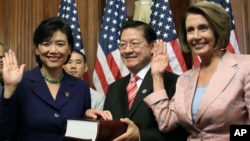Judy Chu is the first Chinese-American woman elected to Congress, making her just one of a historic number of Asian-Americans currently holding public office in the United States.
The most recent National Asian Pacific American Political Almanac, published by the University of California Los Angeles (UCLA), shows more than 4,000 Asian-Americans hold public office across 39 states and the federal government.
Two factors have worked in tandem over the last 40 years, according to the almanac. First, Asian-Americans are the fastest-growing racial group by percentage. In the 1970s, they made up a little over 1 percent of the U.S. population; by 2050, they're projected to comprise 9 percent. Second, Asian-Americans have successfully engaged in local political activism to get elected by their own communities.
Prime example
Chu, a Democrat representing California in the U.S. House of Representatives, never imagined herself holding public office.
"I thought I was going to be a computer scientist ... and never thought of myself as being an elected leader because I never saw the role models growing up," she said.
But when an anti-immigrant, English-only movement swept through her hometown of Monterey Park, California, in the late 1980s, Chu found herself mobilizing. When the City Council passed a resolution that only English could be spoken in the city, Chu helped get it overturned eventually.
"But out of that, I could clearly see that the representation on the City Council did not reflect the population of the city," she said. “And so I ran for City Council."
She won.
From there, Chu went on to become mayor of Monterey Park. She was elected to the California Assembly in 2001, and then to the statewide-elected Board of Equalization.
In 2009, Chu became the first Chinese-American woman elected to Congress. She represents California's 27th District, which has the state's second-highest percentage of Asian-Americans.
Because so few other Asian-Americans held office at the beginning of her political career, Chu said she had to learn how to do everything from scratch. However, her candidacy excited many other Asian-Americans and got them interested in politics.
Chu said this helped her reach out to other ethnic groups.
"I had the excuse of being the candidate to talk to people of all ethnic races and to listen to them about their concerns and their issues," she said. "And what I wanted to do there was to impart to them the idea that I, as an Asian-American, could present them and their needs and that we could all come together on these various issues."
Representing the unrepresented
Chu's ability to work across ethnic groups and social classes is what has made her so successful in politics, said Don Nakanish, professor emeritus of Asian-American studies at UCLA and co-editor of the National Asian Pacific American Political Almanac.
"It was very comfortable for her to build, you know, coalitions and collaborations and to sort of mediate communities," he said.
The rise in Asian-American political activism in the United States, he said, can be partially attributed to this kind of local political incorporation. With each election success an Asian-American has, more excitement and investment in politics follows.
The almanac provides a long list of Asian-Americans currently holding public office at almost all levels of government. They range from Hawaii Senator Mazie Hirono and Louisiana Gov. Bobby Jindal to 4th District Court Judge of Minneapolis, Minnesota, Regina Chu and Irvine, California, Mayor Steven Choi.
Midterm elections
University of Maryland political scientist Janelle Wong said there are few factors to consider with political incorporation.
One is representation, "just having faces that reflect the Asian-American population," Wong said. "I think the more important aspect of political incorporation is having meaningful influence over public policy."
While Asian-Americans have a way to go in the national political realm, they're influencing local policy, according to Wong.
She said the rise in Asian-Americans' political activism as well as their spread beyond the hubs of California and New York may affect the November midterm elections and future races.
Wong said Asian-Americans, who've increasingly voted Democrat over the last two decades, could tip the scales in swing states such as Virginia.
For example, in the past Asian-Americans didn't much care about immigration reform. But thanks to nonprofits and advocacy groups working in Asian-American communities, she thinks there will be support for comprehensive reform.
"And they could have a voice there," Wong said. "And in addition, Asian-Americans are very strong supporters of universal health care, so I think that's another place where the Democrats are going to be advantaged by Asian-American mobilization."
To keep up this political momentum, Asian-Americans must engage others in cities with large Asian populations. They must remember that all politics is local, and that a politician's ability to understand and address constituents' concerns will lead to success.




